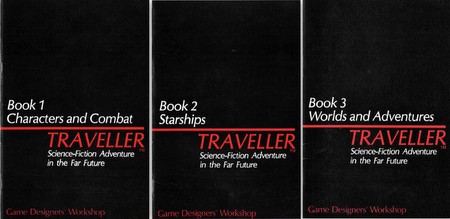What do Skills tell us about Traveller's Setting? A post series.
 |
| The original rulebooks, affectionately called The LBBs. |
Ken Hite, a game designer and writer,
said in a panel discussion at CelestiCon 2011 that skills in an RPG
are part of the setting. As such, they help to define the game world
just as much as the back-story does. (The link there goes to an audio recording of that panel discussion, and is well worth listening to). So I have done an experiment, I've looked at just the skills presented in the oldest Traveller rulebook I have, to see what I could see. I will present my findings in this and a few subsequent posts.
I'm not trying to be purist, as if we
could or should strip Traveller of the 30 years of development and
detail that has naturally grown out of and around it. I simply want
to 'look back' and see what the ideas were at the beginning.
Traveller was meant to do some things, but not everything. For
example, there are no giant robots in the rules, so Japanese anime a
la Robotech was not part of the original scope of the game.
Classic Traveller was inspired by or
based upon a number of science fiction works & series from the
50's and 60's – these provided the inspiration for the setting.
However, In the original Little Black Books there was no
setting at all. Not one planet was ready-made to serve as a setting
for an adventure. The referee and players were supposed to supply
that. You could tell from the title and subtitle that the game
involved travel in space, but that's all.
So, if I found myself in 1977 at my
FLGS, buying this new game Traveller (now referred to as Classic Traveller or CT), with no personal history of
reading science fiction, what assumptions could I make about what I
was supposed to do with this game based on the skills offered?
The skills list for Traveller is not
extensive: there are 18 basic skills, 4 weapon skill
categories, and 8 vehicle operation categories. The categories break
down to a good number of specific weapons and vehicles.
The basic skills were all the tings
the designers decided characters needed formal training to be able to
do. I've further sub-divided them into three categories: space,
technical, and social.We'll look at Space today, and get to the others in later posts.
The Space skills are those which
qualify a PC to serve a crew aboard a starship:
- Piloting
- Navigation
- Engineering
- Steward
- Medic
- Gunner (transferred from the Weapons group).
The crew positions in the starship
operations section each correlated directly to skills. While other
crew positions could be inferred, only the skill matched positions
were required for a ship to make it into space. Thus, a small band of
PCs could operate a starship without the requirement of a big NPC crew.
These skills clearly indicate that
travel and encounters in space are going to be part of the game setting.
Starships were meant to be more than a plot convenience to get
characters from one planetary system to the next. Starships
themselves were a destination and an adventure location! The presence of Gunnery skill indicates the possibility of the PCs encountering hostile forces in space. Places to go, and people who want to stop you from going there.
The PC crew
can decide where the ship goes, so the whole of space is opened to
them, however large that area may be. Judging by the starship
operation rules, solar systems may be very widely separated, and as
such the setting can be quite large.
Furthermore, through possession of
these skills, PCs may operate starships independently. That is, they
can be owners rather than just crew of the ship. This makes the PCs masters of their fates, more or less, able to pursue any goals that may be achieved by traveling in space.
Up next, the Technical skills!
This is a good and tight design - you only need six skills between you to run a versatile starship. At one "important" space skill per character, this caters to a group of 6 players, each with a key job aboard.
ReplyDelete